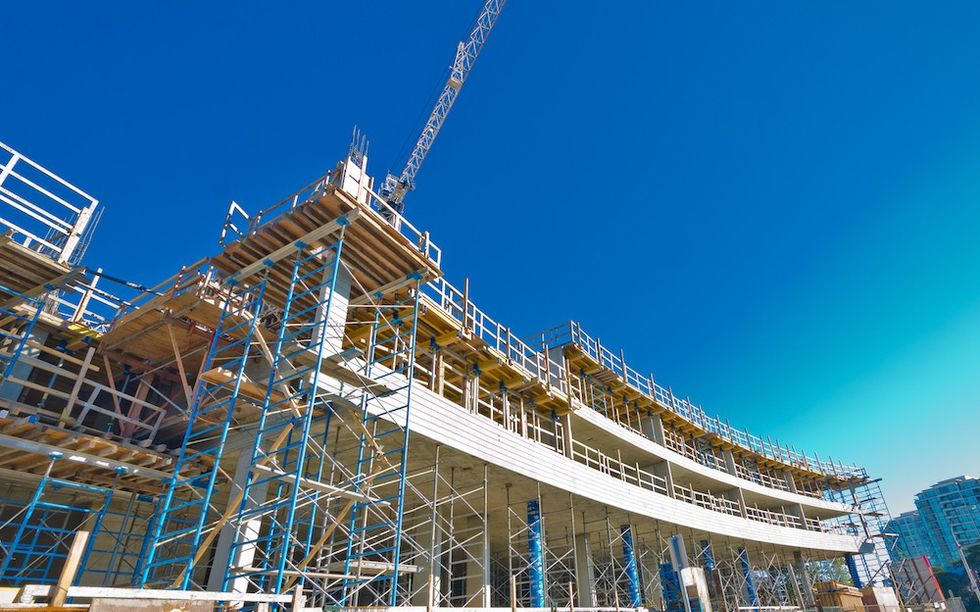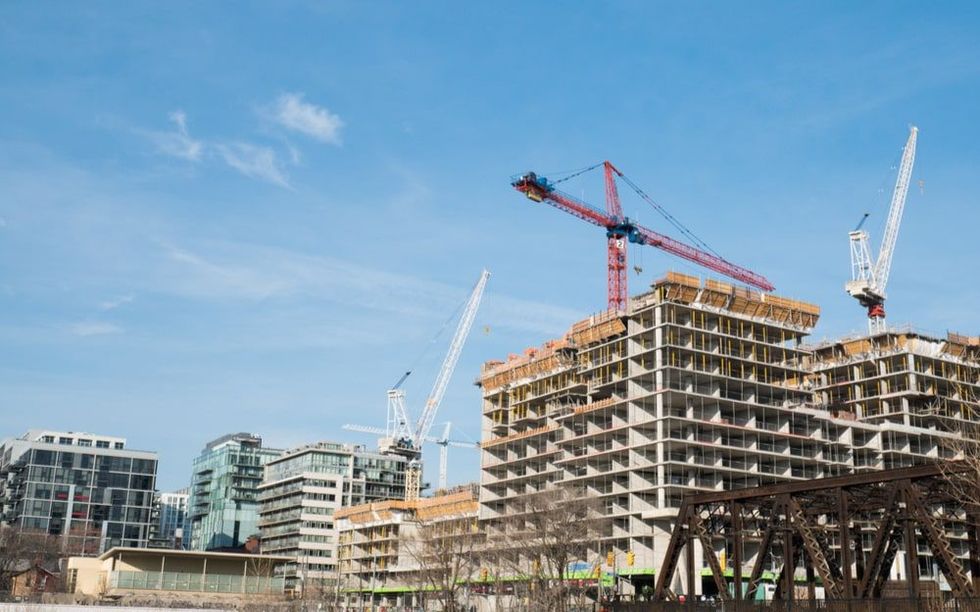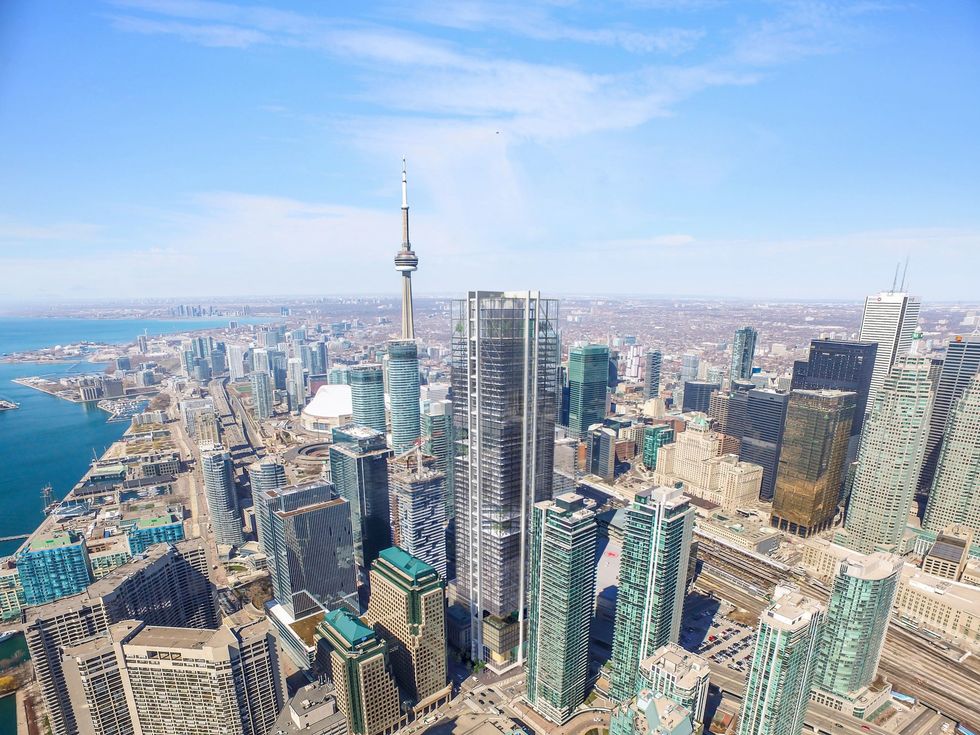The Greater Toronto Area (GTA) isn’t exactly experiencing a flurry of activity on the new build front. “For every crane that comes down, one isn’t going up,” says Richard Lyall, president of the Residential Construction Council of Ontario (RESCON). This quite literal reality marks a shift from the flurry of condo construction activity in recent years that’s earned Toronto the infamous title of “The Crane Capital of North America.”
In short, Lyall says the launch and construction of new condos has virtually stalled – and it’s not too difficult to see why. “If you look at all the numbers right now, we’re in deep trouble economically; productivity is falling, real incomes are falling, we can’t build housing for the middle class, and first-time buyers are extinct,” says Lyall, bluntly. “We’re going to hit bottom. But we still occupy one of the best pieces of real estate on the planet and there are lots of people who want to be here, so if we can get our act together on some systemic problems, we could really take off. It’s just a matter of when that will happen.”
With each recent dismal report on everything from drops in building permits and housing starts to layers of red tape getting in the way, the prospects of meeting housing targets seem more and more unlikely (perhaps even just a pipe dream at this point). Despite a widespread narrative from all levels of government that we need to “get more shovels in the ground,” the GTA’s condo developers are facing numerous roadblocks that prevent this from materializing – from sky-high borrowing costs to limiting regulations. Let’s not forget that Toronto’s development charges shot up 20.7% from their previous rate on May 1 of this year.
The latest Bullpen Research’s Q1-24 GTA High-Rise Land Insights Report highlights the challenges facing the region’s condo developers. It highlights how, over the last three months, the market for new condominium units in the GTA has worsened, with sales activity mirroring the lows experienced during the financial crisis in 2009.

One of the report’s biggest takeaways is that the GTA’s land prices are up 22% – a stat that doesn’t exactly offer the region’s homebuilders much reassurance. According to the report, in Q1-2024, the average estimated land price in the GTA was $106 per-buildable-square-foot (pbsf), a figure that represents that 22% increase when compared to the first quarter of 2023, when the price was $87 pbsf. This increase is partially attributable to a smaller average property size in the first quarter.
According to the report, in Q1-2022, GTA land was priced at $112 pbsf, 5% higher than in Q1-2024. Prior to this, between 2018 and 2021, land prices in Q-1 of each year ranged from a low of $103 bpsf in 2020 to a high of $119 pbsf in 2019. The 2018 price of $106 bpsf was the same as 2024. This data must be examined with a critical and cautious eye, however.
“The price per-buildable-sf increased, but the absolute price declined, as smaller properties sold on average in Q1-2024, reflecting the fact that many of the land trades were additional properties being added to existing assemblies,” says Ben Myers, President and owner of Bullpen Research & Consulting Inc. Myers calls the sample of transactions “very small,” and likely not representative of overall market conditions.
“It is important to reiterate in this report that the average price of land can fluctuate on both a yearly and quarterly basis due to a multitude of factors, including geographical location, property size, and the planning status of the land sales at the time of closing, alongside broader market dynamics,” reads the report. Therefore, it stresses that a “thorough analysis of individual land sales data is necessary” to determine whether changes in land values within a certain timeframe are the result of changes in the composition of the transaction or actually indicate fluctuations in the market.
“Those numbers are always difficult to read,” says Lyall of the report’s land value stats. “Anything in the short-term – like quarterly – fluctuates quite a bit, depending on what’s going on the market and who’s buying, so I wouldn’t worry too much about that. There’s a bigger story about what’s happening when it comes to new builds. I’m not hearing anything particularly positive.”
Whether the Q1 stats set the stage for what’s in store or not, the reality remains that things, frankly, aren’t great. The report highlights the impossible-to-ignore reality that the market for high-density lands is experiencing a downward trend. “Land debt is expensive, vendors are reluctant to drop prices, and many lenders are working with borrowers to avoid distress,” reads the report. “When you combine those factors with a significant decline in the market demand for new condominium apartments, caution prevails.”
The hope is that long-anticipated drops in interest rates will come to the rescue, if even just a little. But, in this economy, rate drops may not be enough. “Our problems go much deeper than interest rates,” says Lyall. “Affordability is 30% of gross income and we’re above 60% now, so we’re way off the mark. When people start looking for different definitions of affordability, you know you have a problem.”

It will take some time to see a meaningful shift, says Myers. Bullpen forecasts around 10,000 new condo sales in the GTA in 2024 – the lowest since the early 2000s.
“Bullpen predicts that 2024 will mark the lowest year for new condo sales in the GTA over the past two decades,” says Myers. “This downturn is anticipated to be more prolonged than those observed in 2009 and 2013. To stimulate significant investor interest in the new condo market, several rate cuts and sustained growth in resale prices will be necessary, which we do not expect to occur until 2025. Consequently, developers must adopt a strategic approach to their launch plans, especially if they have limited flexibility to reduce their revenue targets. Buyers are currently expecting deals and substantial incentives, making it crucial for developers to navigate these demands and needs carefully.”
So, Myers says he expects to see land prices remain low for the foreseeable future. “There would need to be a significant increase in new condo sales absorption activity, further moves by various levels of government to forgive HST on condominium apartments, or a roll back development charges to move the needle on costs and allow developers to meet land vendors value expectations,” says Myers.
Lyall says conversations with industry peers generally forecast that the industry will see meaningful recovery by 2027 or 2028. “I don’t think it will take that long,” say says. “I think we’re smarter than we were in the late 1980s and early 1990s, when we had our last crash.” He remains positive that change is set for the near future that will spur construction momentum.
“The one positive sign I’m looking at is that all levels of government have committed to these housing targets,” says Lyall. But we’re moving in the opposite direction. “We’re hitting a wall and it’s going to force change,” says Lyall. “I know Mayor Chow wants houses built, she wants it done fast, and wants to get things moving. Ontario Housing Minister Paul Calandra has brought in Bill 185 recently and it’s largely positive.”

For now, however, developers of new condos – like countless would-be first-time homebuyers – are still sitting on the sidelines. “Developers are increasingly hesitant to launch new projects due to market uncertainty and a lack of confidence in reaching their pre-construction sales targets,” reads the report. “There were several major developers closing on high-density lands in the first quarter, but many of those were land assemblies started during more favourable market conditions that have holding income.”
According to the report, the region also saw decreasing property size and value. The region’s properties that transacted in the first quarter of the year averaged 0.83 acres in size, nearly half the long-run average of 1.62 acres and something the report says contributed to a lower average sale price of $17.1M in Q1-2024, compared to the long-run average of $24.7M. The report states that market uncertainty and higher carrying costs mean developers are staying away from larger, multi-phased projects.
Generally speaking, the GTA’s new condo market remains in a stand-still. “Developers are being cautious,” says Lyall. “There are better opportunities in rental housing and certain condos are being converted into rentals. One positive impact was the federal and provincial government agreeing to cut the HST on new rental projects, and we need to do the same thing for first-time homebuyers and we’re advocating for that now. We’ve got such demand for housing, that if you can hit a price point, your project is full.”





















